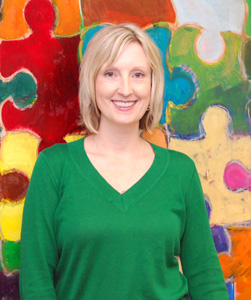Editorial
Front Page - Friday, October 23, 2009
Center offers unique lifespan care for autism spectrum disorders
Samara Litvack

When The TEAM Evaluation Center, Inc., was chartered in 1963, its goal as a not for profit agency was to provide unique, specialized care to people with developmental disabilities. Now known as The TEAM Centers, Inc., the agency continues to achieve that goal by providing treatment, support and general assistance to children and adults with these disorders, as well as to their families.
In 2007, The TEAM Centers decided to increase its services by bringing in a variety of clinicians – including clinical psychologists, pediatricians, social workers and even the region’s only neuropsychiatrist autism specialist – to create a specialized clinic for people already accessing The TEAM Centers. While its name, the Autism Spectrum Clinic, seems to suggest it focuses on one disorder, it actually serves people with all developmental disabilities. The clinic serves approximately 2,000 clients a year with a variety of diagnoses, including autism, brain injury, cerebral palsy, fetal alcohol syndrome, spina bifida and more.
What sets the Autism Spectrum Clinic apart from others in the region is its unique “lifespan” approach. Rather than focusing on intervention or treating only the behaviors or problems of today, TEAM Centers looks at each person’s lifespan, figuring ways to address the roots of issues, and address future issues before they arise.
“They definitely evaluate and address the immediate problems,” says TEAM volunteer Dave Buck. “But then the clinician is always looking down the road. How will the child transition to elementary school? Is the child at risk for behavior problems as a teen? We think about the fact that the person will be an adult and going to be working someday. We need to work toward that. So every treatment plan has that component in it. Here’s what we’re going to do now, but what’s our plan in six months? What’s our plan in a year? What’s our plan in five years?”
And while this sort of treatment makes logical sense, not all clinics or programs are set up in this fashion. Many focus on specific age groups. Many treat specific instances with medicine. But the Autism Spectrum Clinic assesses and works through current situations, all while considering both short-term and long-term effects.
Dr. Leslie Rubin, medical director, and Dr. Karen Weigle, clinical director, work with both children and adults at the Autism Spectrum Clinic. The doctors are also constantly seeking ways to better serve their niche community.
Rubin and Weigle traveled to Phoenix, Ariz., earlier this year to visit the Southwestern Autism Research and Resource Center, which had components similar to their own in terms of its services, but had a different approach as far as community and parental involvement. With support from a developmental pediatrician and other clinicians, parents of children with autism spectrum disorders created programs within this clinic. The families were critical in developing and designing successful programs and, when Rubin and Weigle returned to Chattanooga, they implemented a similar system of their own.
With support from The TEAM Centers, they created the Chattanooga Autism Center to act as a parent-centered support for families of children and adults with autism spectrum disorders. Under the umbrella of the Chattanooga Autism Center are a variety of support systems, including the already existing Autism Spectrum Clinic, as well as various programs, workshops, support groups and more.
“The parent advisory group meets and their biggest responsibility is to take whatever ideas any of the parent volunteers have, write them up and then present them to the board of directors of TEAM,” says Buck.
“Then they determine whether they can meet those needs (and) provide that back to the parents, who then collaborate to put the idea into place. The goal is for the parents to run the center.”
Whether parents request a specific workshop or simply need space on Saturday mornings for a support group, the Chattanooga Autism Center works to provide what is needed by parents of children and adults with autism spectrum disorders. One such request, recently met through the creation of a workshop, was for information regarding the DIR/Floortime model, a concept specifically geared toward the social engagement of people with autism.
“(It’s) one of the time-tested and empirically-backed techniques used to promote engagement of the person with autism with the world around them. ” says Buck.
Chattanooga Autism Center workshops are held monthly for the community, and the next one will be held on Monday, Nov. 2, regarding nutrition and autism.
The Department of Health and Human Services National Survey of Children’s Health recently reported that an average of one in 91 children in the United States have an autism spectrum disorder. The report showed occurrences in all racial, ethnic and socioeconomic groups.
While people come to the Chattanooga Autism Center by referrals from physicians or teachers, self-referrals are also accepted. According to the Autism Society of America, children and adults with autism may: not understand what others say, appear deaf, be unable to speak or speak with difficulty, engage in repetitive behaviors, act upset for no apparent reason, appear insensitive to pain, appear anxious or nervous, dart away from people unexpectedly and engage in self-stimulating behaviors, such as hand flapping or rocking.
While these behaviors are not definite signs of autism, any combination of many of them may be cause for a child or adult to be tested. For more information, call 423-622-0500 or visit www.TEAMCENTERS.org.
|
|